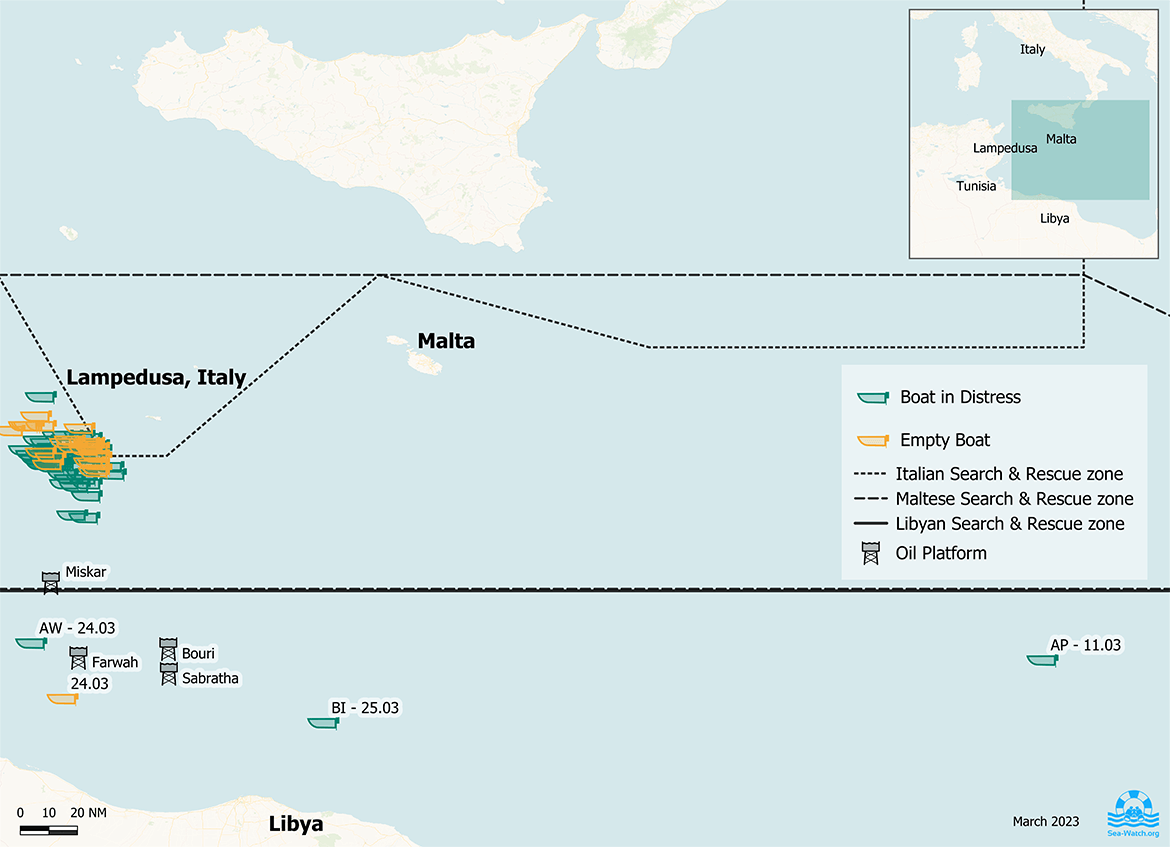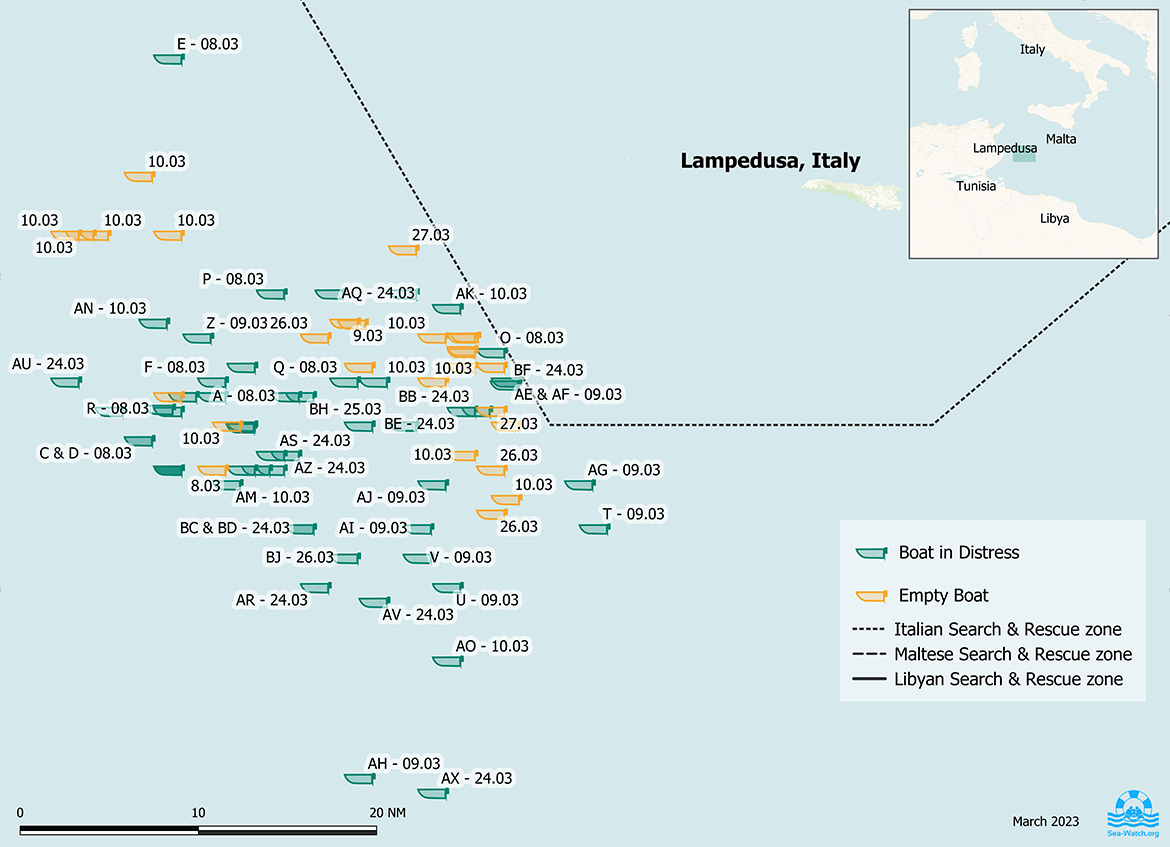
This factsheet presents a summary of the distress cases witnessed in March 2023 by Sea-Watch’s Airborne Operations with the aircraft Seabird 2.1 In March 2023, we conducted 12 operations over a total flight time of 77 hours and 14 minutes. We spotted 62 boats, carrying over 2.091 persons2 in distress at sea.
1. Overview of boats in distress and empty boats spotted
Libyan Search and Rescue (SAR) zone
- 47 persons, on board 1 boat in distress, were rescued by the merchant vessel Froland and disembarked in Italy. 30 persons however went missing due to inaction by the authorities of European member states.
- 78 persons, on board 1 boat in distress, were rescued by the NGO vessel Louise Michel3 and disembarked in Trapani, Italy.
- 89 persons, on board 1 boat in distress, were intercepted by the so-called Libyan Coast Guard. During the interception, the persons in distress and the crew of the NGO vessel Ocean Viking4 were threatened by the so-called Libyan Coast Guard.
Maltese Search and Rescue (SAR) zone
- Around 30 persons, on board 1 boat in distress, were illegally intercepted by the Tunisian Coast Guard in the Maltese SAR zone.
- 270 persons, on board 6 boats, were rescued by the Italian authorities and disembarked in Italy.
- 39 persons, on board 1 boat, were rescued by the NGO vessel Louise Michel and disembarked in Trapani, Italy.
- 38 persons, on board 1 boat, were rescued by the NGO vessel Life Support5 and disembarked in Ortona, Italy.
- The outcomes for around 1.500 persons in distress, concerning around 50 boats, remain unknown.6
In March 2023, we must assume that the European Border and Coast Guard Agency Frontex was involved in the narratives for at least 568 persons in distress, on board 14 boats sighted by Seabird 2’s crews. 13 of these boats were sighted in the Maltese SAR zone, mainly on the route between Tunisia and Italy. 3 boats were rescued by the Italian authorities. 1 boat was rescued by the NGO vessel Louise Michel. The outcomes for the other 10 boats in distress remain unknown.
In March 2023, we sighted 30 empty boats. Their outcomes remain unknown.
2. Details and outcomes regarding selected boats in distress and empty boats
Tunisia is not a place of safety
Over the past months, the crackdown against perceived political opponents, civil society and minoritized populations in Tunisia has intensified. In addition, on February 21st the Tunisian President Kais Saied held a hateful, racist and discriminatory speech towards persons on the move from sub-Saharan African countries in Tunisia.7 This led to, amongst other things, physical and institutional violence, a wave of racism and evictions of minority persons by landlords.8 A self-organized protest movement demands the UNHCR to comply with its mandate and play a role in the evacuation of persons to safe places.9
On the 8th and 9th of March alone, as a consequence of the unsafe situation in Tunisia forcing people to leave the country (amongst other factors), Seabird 2’s crews sighted 19 and 17 boats respectively. The number of rescues by the Italian authorities as well as arrivals in Lampedusa were particularly high during these days.10 As the boats departing from Tunisia usually carry a comparable number of people and look similar, it was however not possible to clearly assign the outcomes for the boats we spotted. Moreover, Seabird 2’s crews sighted an interception by the Tunisian Coast Guard in the Maltese (!) SAR zone – although Malta is responsible for this area and must respect international maritime and human rights law (distress case AC).
The activities of the Tunisian Coast Guard have markedly increased recently. According to the organisation Forum Tunisien pour les Droits Economiques et Sociaux (FTDES), 7.494 persons were intercepted and pulled back to Tunisia in March alone.11 There exist continuous testimonies of violent behaviour by the Tunisian forces at sea.12
Sea-Watch has asserted for many years that Tunisia is not a safe place for rescued persons. 68 organisations as well as Sea-Watch have again stated that Tunisia is neither a so-called safe country of origin for Tunisian citizens nor a place of safety for those rescued from distress at sea.
Together, we ask the authorities of the European Union and its member states to stop their cooperation with Tunisian authorities on migration control. We also ask them to stop their financial and technical support to the Tunisian Coast Guard, and provide safe routes for all.13
 Note: By the time the Airborne Monthly Factsheet was finalised, the European Union and Tunisia had signed a Memorandum of Understanding on 16th July 2023.14 In particular, the agreement foresees more than 100 Million Euros of EU funds being allocated to border management, with a focus on increasing the capacities of the Tunisian Coast Guard, more returns of people and no provision of safe and legal escape routes. Such a deal will inevitably lead to more pullbacks, and deportations from the EU to Tunisia as well as from Tunisia to other countries of origin. The deal will strengthen a cycle of abuse and result in severe human rights violations – encouraged and supported again by the European Union and its member states.
Note: By the time the Airborne Monthly Factsheet was finalised, the European Union and Tunisia had signed a Memorandum of Understanding on 16th July 2023.14 In particular, the agreement foresees more than 100 Million Euros of EU funds being allocated to border management, with a focus on increasing the capacities of the Tunisian Coast Guard, more returns of people and no provision of safe and legal escape routes. Such a deal will inevitably lead to more pullbacks, and deportations from the EU to Tunisia as well as from Tunisia to other countries of origin. The deal will strengthen a cycle of abuse and result in severe human rights violations – encouraged and supported again by the European Union and its member states.
11.03., distress case AP: 30 persons were left to die due to inaction by the authorities of European member states.
The people in distress reached out to the Alarm Phone on 11th March during the night, where Alarm Phone immediately and continuously informed the authorities. Seabird’s crew then sighted the persons in distress in the morning in the Libyan SAR zone and sent out a mayday relay.15 The merchant vessel Basili L acknowledged the mayday relay and headed to the position. On the phone, the Italian authorities only referred to the Libyan authorities and then hung up. The merchant vessel Basilis L stated on the radio that it was in exchange with the Libyan authorities, following instructions from the Italian authorities. However, the Libyan authorities stated to Seabird’s ground crew on the phone that there was no vessel available to be sent from Benghazi to the boat in distress. The Italian authorities were informed about this, but again hung up on Seabird’s ground crew – the same then happened with the Maltese authorities. According to the Alarm Phone, the Libyan authorities stated that the Italian authorities had taken over coordination of the case. Ultimately, on the morning of Sunday 12th March, the merchant vessel Froland was able to take 17 persons on board. 30 persons however went missing. Froland disembarked the survivors in Pozzallo, Italy.
On 13th March, the Italian authorities sent out an Inmarsat Message 16 on behalf of JRCC Tripoli to all vessels to maintain a sharp lookout for the 30 missing persons.
Together with Alarm Phone and Mediterranea Saving Humans17, we demand the end of the border externalisation policies and delegation of duties to Libya. We urge the European Union to ensure safe and legal pathways to Europe and engage in coordinated Search and Rescue operations instead of financing and equipping the so-called Libyan Coast Guard, supporting pullbacks which are illegal under international law.
25.03., distress case BI: the so-called Libyan Coast Guard endangered the lives of persons in distress and threatened the crew of the Ocean Viking.18
The persons in distress called the Alarm Phone, which immediately informed the authorities about the situation. Seabird 2’s crew then sighted the persons in the Libyan SAR zone. The NGO vessel Ocean Viking as well as the so-called Libyan Coast Guard patrol boat vessel 656 were heading towards the people. Shortly afterward, Seabird 2 sighted the Libyan patrol boat blocking the Ocean Viking and shooting in the air towards the persons in distress multiple times. This life-threatening behaviour lasted for around an hour. One person on board the boat in distress even fell into the water. In the end, the persons were intercepted and pulled back to Libya.
During the incident, the Italian and Maltese authorities were called. While the RCC Malta took the information, the Italian authorities only notified that the so-called Libyan Coast Guard were operating in the Libyan SAR and then hung up on Seabird 2’s ground crew.
We appeal for an immediate end to any policy, funding or programme from the EU and its member states, especially Italy and Malta, which carries the aim of externalising the duty to render assistance to the so-called Libyan Coast Guard and other Libyan entities. Instead, the EU and its member states shall comply with their duties, including the duties to rescue and disembark people in a place of safety and abide by the principle of non-refoulement.
- 1 Since 2017, together with the Swiss NGO Humanitarian Pilots Initiative, Sea-Watch monitors the Central Mediterranean Sea with its aircraft Seabird 1 and Seabird 2.
- 2 These numbers are based upon the estimations of Seabird 2’s crews as well as numbers which the initiatives Watch The Med – Alarm Phone, SAR NGOs and Mediterranean Hope-FCEI have provided to us.
- 3 The Louise Michel is operated by the collective Louise Michel.
- 4 The Ocean Viking is operated by the NGO SOS MEDITERRANEE.
- 5 The Life Support is operated by the NGO EMERGENCY.
- 6 The boats described likely arrived to Lampedusa, Italy. Unfortunately however due to the high volume of arrivals during these days, a cross-matching of cases remained impossible.
- 7 See: amnesty.org/en/latest/news/2023/03/tunisia-presidents-racist-speech-incites-a-wave-of-violence-against-black-africans/
- 8 See testimonies gathered by Human Rights Watch: hrw.org/news/2023/03/10/tunisia-racist-violence-targets-black-migrants-refugees and Amnesty International: amnesty.org/en/latest/news/2023/03/tunisia-presidents-racist-speech-incites-a-wave-of-violence-against-black-africans/
- 9 Follow the self-organized protest on twitter.com/RefugeesTunisia
- 10 infomigrants.net/en/post/47401/italy-over-1300-migrants-reach-lampedusa-in-24-hours
- 11 Data available at: ftdes.net/statistiques-migration-2023/
- 12 See: ftdes.net/en/politiques-meurtrieres-en-mediterranee-pour-que-cessent-ces-naufrages-consciemment-provoques-au-large-de-la-tunisie/










